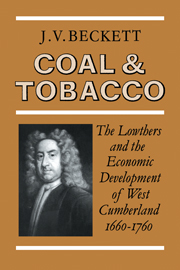Book contents
- Frontmatter
- Contents
- List of Tables
- List of Illustrations
- Note on Dates
- Preface
- INTRODUCTION
- 1 THE LOWTHERS: LANDOWNING-ENTREPRENEURS
- 2 COAL: MONOPOLY AND COMPETITION
- 3 COAL: THE STRUCTURE OF TRADE AND INDUSTRY
- 4 THE EXPANSION OF TRADE
- 5 THE DEVELOPMENT OF INDUSTRY
- 6 COMMUNICATIONS
- 7 CREATING NEW TOWNS: URBAN GROWTH
- CONCLUSION
- Appendix 1 The Lowther Family
- Appendix 2 Sir James Lowther's Investments
- APPENDIX 3 The Lowthers' Land Transactions
- Appendix 4 Colliery Figures
- Notes
- Bibliography
- Index
- Frontmatter
- Contents
- List of Tables
- List of Illustrations
- Note on Dates
- Preface
- INTRODUCTION
- 1 THE LOWTHERS: LANDOWNING-ENTREPRENEURS
- 2 COAL: MONOPOLY AND COMPETITION
- 3 COAL: THE STRUCTURE OF TRADE AND INDUSTRY
- 4 THE EXPANSION OF TRADE
- 5 THE DEVELOPMENT OF INDUSTRY
- 6 COMMUNICATIONS
- 7 CREATING NEW TOWNS: URBAN GROWTH
- CONCLUSION
- Appendix 1 The Lowther Family
- Appendix 2 Sir James Lowther's Investments
- APPENDIX 3 The Lowthers' Land Transactions
- Appendix 4 Colliery Figures
- Notes
- Bibliography
- Index
Summary
Sir James Lowther died suddenly on 2 January 1755 at the age of 81.The wealthiest commoner of his generation, a giant of the stock market, and the longest-serving Member of Parliament, he was undoubtedly one of the most successful of eighteenth-century entrepreneurs. The west Cumberland he left behind was very different from that of a century, or even a half-century earlier. Whitehaven and Workington, fishing villages in 1660, had grown into important commercial towns, while Maryport, planned along similar lines to Whitehaven, was rapidly emerging as a third centre. Local population had increased substantially; harbours had been improved and extended; even the road network had seen the first evidence of change and alteration. All this was in response to the staple coal trade, which had been growing since the early seventeenth century in line with expanding demand from Ireland. In the wake of this success, although independently developed, the tobacco trade had become an important second interest at Whitehaven. Links had also been established with the West Indies and the Baltic. Partly on the strength of merchant capital new industries at last began to emerge in the 1730s and 1740s. By any standards the developments of the later seventeenth and early eighteenth centuries were impressive; as a port Whitehaven took its place alongside Hull, Bristol and Liverpool among the outports; as an industrial centre it bore comparison –if on a smaller scale – with Newcastle.
- Type
- Chapter
- Information
- Coal and TobaccoThe Lowthers and the Economic Development of West Cumberland, 1660–1760, pp. 201 - 209Publisher: Cambridge University PressPrint publication year: 1981



